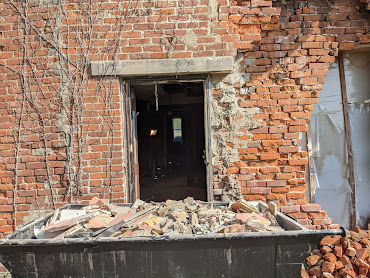NEVER TO LATE 9/1/21
9/1/21
File under, "It is never too late to learn"
One of the issues that has gathered a lot of press time recently is the concept of American Exceptionalism. There is a big difference in how Americans see themselves and how much of the world sees us. The US is physically a big country (3rd largest), and many of our states have economies larger than many countries. But Americans' have a problem; We know very little of how the rest of the world thinks, what their values and what their culture consider important. We are very much like a bull in a china shop, and this attitude hurts us in so many ways.
Here is an article that discusses this very issue, I have listed key points from it for those too busy to read it in it's entirety;
This is from the Washington Post, which is consider a pretty good source for news.
8/31/21 at 3:51 p.m. EDT
Opinion: I was a combat interpreter in Afghanistan, where cultural illiteracy led to U.S. failure. by Baktash Ahadi
Baktash Ahadi served U.S. and Afghan Special Operations forces as a combat interpreter from 2010 to 2012 and is a former chair of the State Department’s Afghan Familiarization course.
"As a former combat interpreter who served alongside U.S. and Afghan Special Operations forces, I can tell you part of the answer — one that’s been missing from the conversation: culture."
"...When comparing the Taliban with the United States and its Western allies, the vast majority of Afghans have always viewed the Taliban as the lesser of two evils."
"...The coalition,...built highways. It emancipated Afghan women. It gave millions of people the right to vote for the first time ever."
"...The Americans also went straight to building roads, schools and governing institutions — in an effort to “win hearts and minds” — without first figuring out what values animate those hearts and what ideas fill those minds. We thus wound up acting in ways that would ultimately alienate everyday Afghans."
"......Western governments personel...were required to stay “inside the wire,” meaning they were confined at all times to Kabul’s fortified Green Zone and well-guarded military bases across the country." "...if they had been allowed to mingle with Afghans, they would been able to enjoy the same experiences — the scent of kebab in Shahr-e Naw, the hustle and bustle of Qala-e Fathullah — they might have developed a much better feel for the country, its people and its culture."
"...virtually the only contact most Afghans had with the West came via heavily armed and armored combat troops. Americans thus mistook the Afghan countryside for a mere theater of war, rather than as a place where people actually lived."
"U.S. forces turned villages into battlegrounds, pulverizing mud homes and destroying livelihoods. One could almost hear the Taliban laughing as any sympathy for the West evaporated in bursts of gunfire."
"Sometimes, yes, (the US)..built good things — clinics, schools, wells. But when the building was done, we would simply leave. The Taliban would not only destroy those facilities, but also look upon the local community with greater suspicion for having received “gifts” from America."
"...the front-line troops were given zero training in cultural literacy. The Marines I worked with were shocked, for example, to hear me exchanging favorite Koran verses with my fellow Afghans, mistaking this for extremism rather than shared piety".
"When talking to Afghan villagers, the Marines would not remove their sunglasses — a clear indication of untrustworthiness in a country that values eye contact."
..." In some cases, they would approach and directly address village women, violating one of rural Afghanistan’s strictest cultural norms."
"...(mistakes) such as these sound almost comically basic, ... But multiplied over millions of interactions throughout the United States’ two decades of wheel-spinning in Afghanistan, they cost us dearly in terms of local support."
"...From the point of view of many Afghans, Americans might as well have been extraterrestrials...looking and acting alien, and always bringing disruption, if not outright ruin. We failed to understand what made sense for Afghans time and time again".
"...This isn’t just about Afghanistan. When it comes to cultural illiteracy, America is a recidivist. We failed to understand Iraqi culture, too, so that now, many Iraqis see Iran as the lesser of two evils. Before that, we failed to understand Vietnam...Wherever our relentless military adventurism takes us next, we must do better".
The article can be read in it's entirety here; https://www.washingtonpost.com/.../afghanistan-combat.../
A good source for building a foundation for a better understanding how the world sees us, and how we can improve this image see Wayne Selcher's essay here; https://www.opeu.org.br/.../is-the-united-states.../ It has over 230 links to high quality research, news, and information.


Comments
Post a Comment